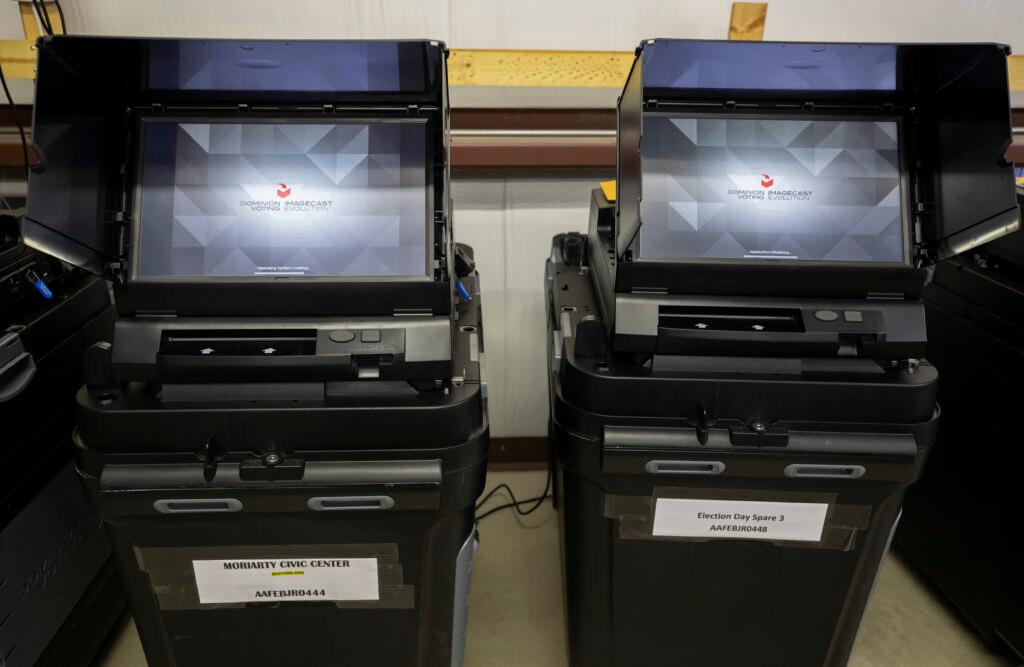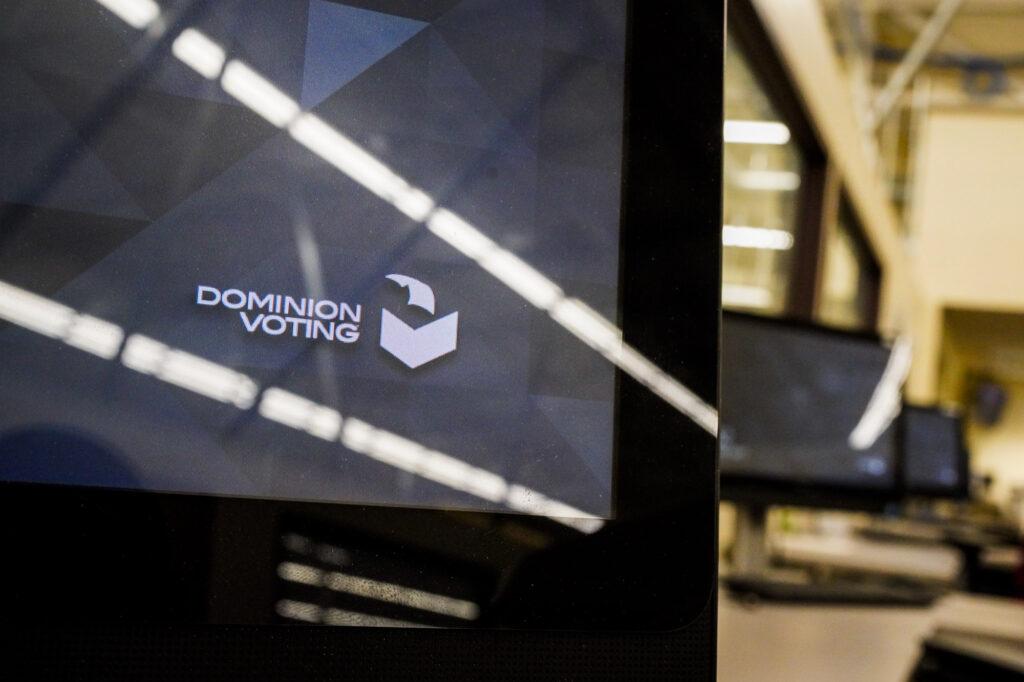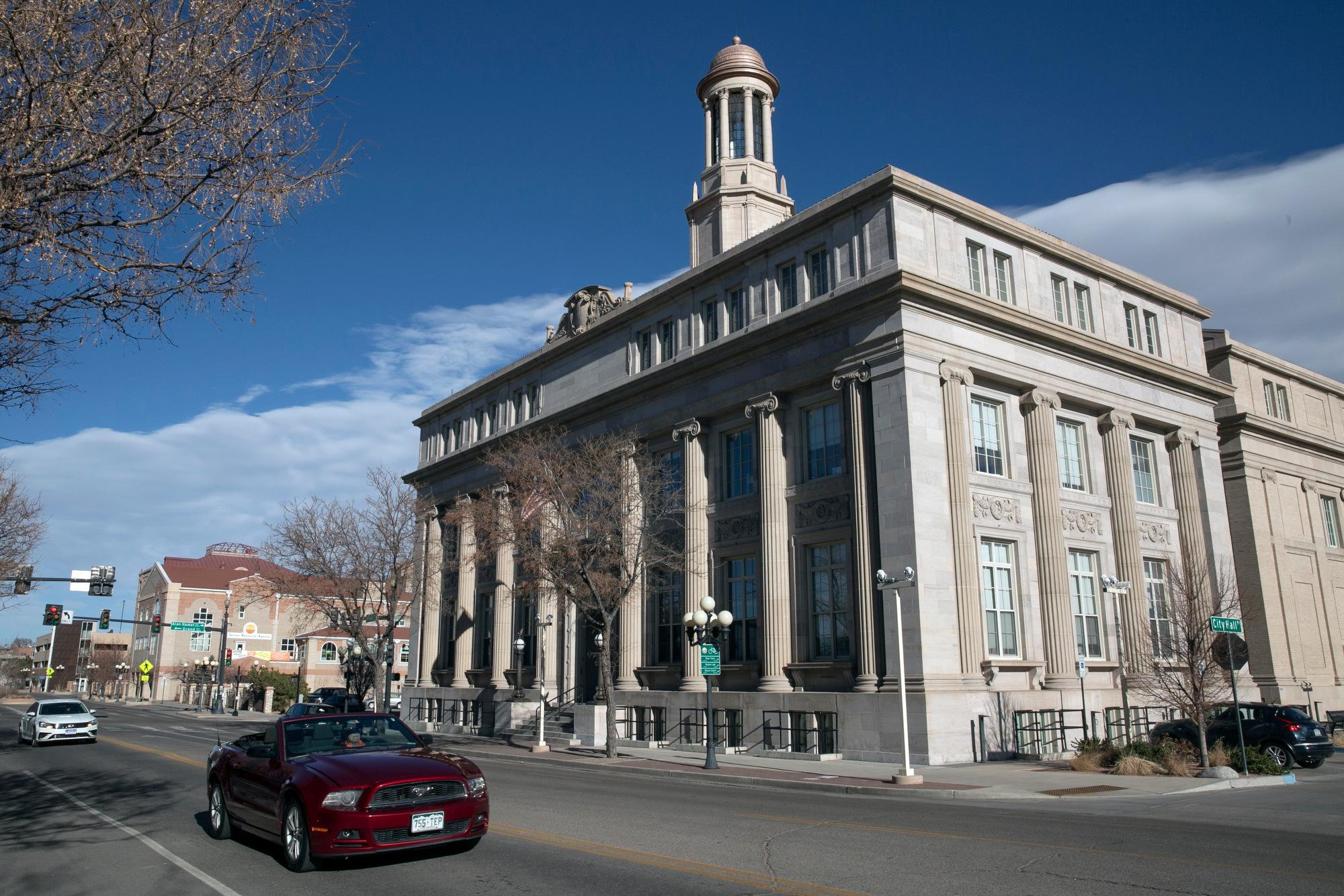
Dominion Voting Systems says lies about its role in the 2020 election have destroyed its brand and business, an argument it will lay out in full in the company’s blockbuster defamation trial against Fox News, which is scheduled to begin next week.
Dominion, one of the country’s largest vendors of election equipment, is seeking $1.6 billion in damages against Fox.
Immediately after the 2020 presidential election, Dominion found itself at the epicenter of false claims that the company’s machines somehow flipped votes from President Trump to Biden. Audits and hand counts in states that use Dominion equipment have verified the accuracy of the results.
The trial will open with one big question already settled. The voting company has already successfully made the case to a Delaware Superior Court judge that some Fox News shows spread false information about it.
But other questions remain. First, the company will have to show the comments were made with “actual malice”, a requirement of proving defamation. And then it must convince the jury that its eye-popping damages request is justified.
“People have been put into danger,” said CEO John Poulos in an interview on 60 minutes discussing the toll conspiracy theories have taken on the company. “Their families have been put into danger. Their lives have been upended and all because of lies. It was a very clear calculation that they knew there were lies and they were repeating them and endorsing them.”
Can Dominion prove that Fox News’ coverage hurt its bottom line?
But to win the damages it’s seeking, Dominion needs to show the hits to its reputation from Fox News haven’t just been hard on employees, but have also resulted in large financial losses.
And that could prove a tougher sell.
“You're talking about economic damages and economic disturbance, and so emotional feelings, hurt feelings, emotional damages, those kinds of things typically are not going to enter into the calculation,” said Len Niehoff, a law professor at the University of Michigan.
Niehoff said it can be tricky for companies to connect the dots between current — and future — business loss and the particular root causes of it.
“These are things that very often can't be proven with mathematical precision. It can be very hard to show that people who didn't do business with you didn't do it for this reason as opposed to for some other reason,” he said.
For Dominion that will mean proving that governments aren’t using its equipment specifically because of misinformation, and not, for instance, because of changes brought on by the pandemic or other forces.
“Economic causation can arise from so many different factors that juries can start to struggle to figure out what's fairly attributable to a defamatory statement or an allegedly defamatory statement and what's not,” said Niehoff.
The company argues in court filings that it went to herculean efforts to make Fox aware of both the falseness of what was being said on the airwaves and the damage it was doing to Dominion.
“At trial, Dominion will establish the extent of the ongoing and substantial economic harms that flow from Fox's defamation: from out-of-pocket costs like security detail to protect its employees, to the ultimate destruction of its enterprise value and, in the alternative, lost profits.”
For its part, Fox News calls Dominion’s claims nothing more than a deeply flawed money grab. It argues the $1.6 billion figure isn’t based on any financial records, but instead assumes the company will be completely out of business by 2031.
The damages claim assumes that, “Dominion is not going to gain any new customers, not a single new customer is going to walk in the door,” said Scott Ahmad, an attorney representing Fox News in previous court filings.
“In addition, for the existing customers, they are not going to get any new business from existing customers after 2024.”

Where is Dominion equipment used?
The election security non-profit Verified Voting monitors election equipment contracts around the country.
According to an analysis the group provided to NPR, Dominion has actually seen a net increase in the number of jurisdictions using the equipment since 2020. That includes new contracts for tabulators, ballot marking machines and accessible voting equipment.
For example in 2020, 1,161 jurisdictions used Dominion Election Day tabulation equipment. For the 2024 election, Verified Voting found the figure will increase to 1,861. Yet those contracts will end up covering fewer voters, because of the size of the places involved.
“So I think what's notable is that you can have many jurisdictions, some of which are quite small,” said Pamela Smith, the CEO of Verified Voting, about the discrepancy.
She said it’s not necessarily surprising that jurisdictions have stayed with the company despite the false claims.
“Most jurisdictions don't change their voting systems like every couple of years, right? They change them 10 years, 15 years,” Smith said.
A lot of that is due to the huge cost, she said, as well as administrative challenges.
Smith said it is very difficult to predict what could happen to Dominion’s business years into the future, for instance if a jurisdiction does shut Dominion out of the bidding process.
“Where previously they had an okay relationship, or a state might say, ‘well, we're gonna go with this brand and then find out, oh, on second thought, we're not because the pushback is really hard.’ I suspect there's a lot of that and more than what actually shows on the surface,” Smith said.
Professor Niefhoff said while an increase in business is to some degree at odds with seeking monetary damages, Dominion can still make the case that growth has been thwarted.
“Dominion could have an argument that, although their business statements have gone up, it hasn't gone up as much as it would've gone up, but for the defamatory statements.”
Shasta County, California — harbinger or outlier?
Dominion does already have some examples it can point to. The most recent is Shasta County in the northernmost part of California. The county’s contract with Dominion wasn’t up for renewal until 2025, but local officials there decided to take it up sooner.
“We're talking about the Dominion voting contract and how we are going to trust this contract or not. And are you going to help us restore trust with Dominion or not?” Shasta County Board Supervisor Patrick Henry Jones asked the local clerk and recorder during a public meeting in January on the future of the contract.
He said public trust in Dominion “doesn’t exist within Shasta County.”
The clerk vehemently disputed that assertion and argued that getting rid of Dominion would be not only a logistical nightmare for her office, but also a huge cost to the county. The law requires it to have at least some machines to allow those with disabilities to vote independently. But her objections didn’t change the outcome; last month the board voted 3-2 to stop doing business with Dominion.
“Our board of supervisors voted to cancel the Dominion contract without any regard or request for information from the elected registrar of voters,” said Joanna Francescut, the assistant county clerk who runs the day-to-day elections office.
Trump carried Shasta County by nearly 30 points in 2020, and Francescut said that when he didn’t win the election, many local voters were left angry and looking for something to blame. And she thinks much of the misinformation that has circulated about Dominion can appear believable to people, even though the county runs fair, transparent, secure elections.
Francescut worries that falsehoods about the company put Shasta County at risk of not being able to conduct the upcoming election.
She said she’s worked with some employees at Dominion for over 20 years.
“And their knowledge and their expertise on how elections work is actually a really key piece to us being successful in our work because each state is different.”
For Dominion, the big question is — will other deep red counties follow Shasta’s lead?

Breaking up with an elections company isn’t easy.
So far, that doesn’t appear to be happening. Around the country, conservative counties appear to be sticking with Dominion for the time being, despite voter distrust.
For one thing, changing out voting technology comes with a lot of expense, and a lot of hassle.
“You're talking about learning how to use the system, learning how to program the ballots in the election, learning how to just figure out the tabulation and the software and the hardware,” said Fremont County Clerk Justin Grantham.
Grantham is a Republican and the head of the Colorado County Clerks Association. He just renewed his lease with the company. He points out audits consistently show that the Dominion machines accurately count ballots, and that training election judges and staff on new equipment would be a huge undertaking.
“You're talking massive training requirements for something that's used, oh gosh, once a year in the odd years and two to three times in the even years.”
Many clerks and election experts say it likely will be years before the biggest impacts of the misinformation spread about Dominion are known, when current voting machine contracts come due, and officials in conservative counties face political pressure to look elsewhere for their equipment.









